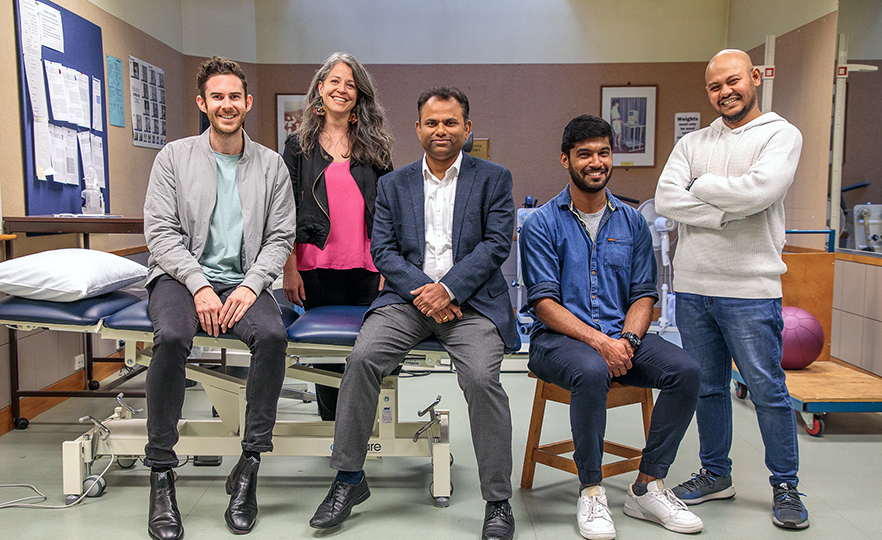
This interdisciplinary research programme aims to improve the clinical outcomes of people with chronic pain, a significant public health problem affecting around 1 in 5 New Zealand adults.
The OPaMeN research programme has two key objectives:
The first objective involves understanding biopsychosocial (psychophysical, brain activity, and molecular, psychosocial) and behavioural risk factors/phenotypes driving the chronic pain experience, including the role of early to midlife risk factors.
Biopsychosocial risk factors for chronic pain are present well before its development. Identifying such factors before chronic pain development (e.g., in childhood) could help understand why some individuals are vulnerable to significant pain and disability and direct to developing interventions targeting those risk factors, potentially changing the outcome of the pain experience in adulthood. Little is known about these risk factors and the pain experience by those currently affected by chronic pain.
The World-famous Dunedin Multidisciplinary Health and Development Study (Dunedin Study) provides an opportunity to discover early to midlife biopsychosocial risk factors' role in adult pain experience.
The second objective involves developing and testing interventions targeting neural factors to improve clinical outcomes in people with chronic. Te-Tiriti led Clinical trials are being carried out to test the efficacy/effectiveness of self-regulatory (such as mindfulness meditation and neurofeedback MiNT clinical trial ) and neuromodulatory (electrical stimulation of the brain) interventions targeting neural and psychological factors to improve chronic pain outcomes.
The programme has developed meaningful relationships with Māori researchers, clinicians and Ngāi Tahu kaumatua to design culturally responsive clinical trials to address inequities in pain management. Relationships established with key industry partners for co-developing neuromodulation programs and ensuring wider dissemination through industry-based innovations in stimulation programs/devices.
Watch the OPaMEN Research Programme video highlighting the programme's work was developed in collaboration with UO science communication.
Publications/outputs:
Refer to the ResearchGate
Translating knowledge
Translating knowledge generated to stakeholders is a key part of research programme activities. The programme's findings have been disseminated nationally and internationally to end users through publications, presentations, workshops and public lectures. The programme has been profiled in media, highlighting the biopsychosocial mechanisms behind pain experience.
Research capacity building
Several PhD graduates have been produced, contributing to pain research in NZ and worldwide.
Early career researchers have been effectively mentored to build their independent pain research programmes. Pain research opportunities were provided for several masters, honours, and summer research, including Māori and Pacific students.
Funding
Health Research Council Feasibility Grant
Health Research Council Emerging Researcher First Grant
Health Research Council Programme Grant (NI, Dunedin Study)
Otago Medical Research Foundation Jack Thompson Arthritis Funds
University of Otago Research Grant
Lottery Health Translational Research Grant
Healthcare Otago Trust Fund
DSM Dean's Bequest funding
Pain at Otago Research Theme
Collaborating investigators
International:
- Professor Jo Nijs, Department of Physiotherapy, Human physiology and anatomy, faculty of physical education and physiotherapy, Vrije Universiteit Brussel, Belgium
- Professor Roger Fillingim, Director, Pain Research and Intervention Center of Excellence, University of Florida,
USA - Associate Professor Sven Vanneste, Director, Global Brain Health Institute, Lab for Clinical & Integrative
Neuroscience, Trinity College Dublin. - Associate Professor Fadel Zeidan, Department of Anesthesiology, University of Southern California, San Diego,
USA - Professor Temi Moffit, Professor of Psychology and Neuroscience, Duke University, NC, USA.
- Professor Kavitha Raja, Deputy director of JSS Rehabilitation Centre, India
Local/national:
- Professor Richie Poulton, Director- Dunedin multidisciplinary health & development research unit, Department of psychology, University of Otago.
- Professor Ted Shipton, Director, Pain @ Otago Research Theme Department of Anaesthesiology, University of
Otago. - Associate Professor Nicola Swain, Psychological Medicine, University of Otago
- Dr Ben Hudson, Head of the Department- General Practice, University of Otago, Christchurch
- Dr Saad Anis, Clinical Director, Pain medicine, Specialist, Chronic Pain services, Bay of Plenty, New Zealand.
- Dr Erik Wibowo, Lecturer, Department of Anatomy, School of Biomedical Sciences, University of Otago.
- Associate Professor Jeremiah Deng, Department of Information Sciences, University of Otago.
- Dr Jerin Mathew, Department of Anatomy, University of Otago
- Dr Carrie Falling, School of Physiotherapy, University of Otago
- Dr Divya Adhia, University of Otago
- Professor Dirk De Ridder, University of Otago
- A/P Rajesh Katare, University of Otago
NZ based Māori Researchers and clinicians:
- Katrina Bryant, Kaiarahi Māori, Lecturer, Te Kura Komiri Pai, School of Physiotherapy, University of Otago
- Dr Luke Wilson, Research fellow, Integrative human physiologist, Dunedin School of Medicine, University of
Otago - Dr Sharon Awatere, The Health Boutique, Napier, New Zealand
Contact
Group lead: Associate Professor Ramakrishnan Mani
